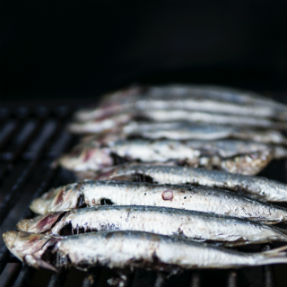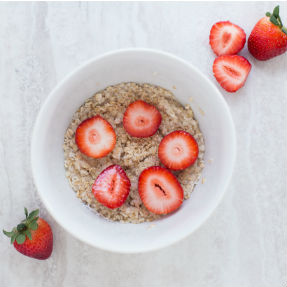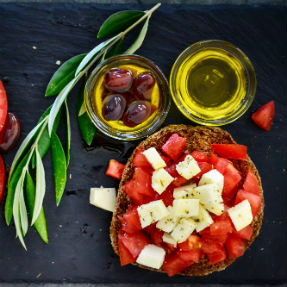Eat your way to a healthy heart
Almost 200,000 people are dying a year from heart disease or stroke and heart disease currently affects around 7 million people in the UK. It's more important than ever to try and prevent your risk of cardiovascular diseases. Research shows that 80 percent of deaths could be prevented in the under 75s if you just show your heart a bit of love.
One of the best places to start is your diet. By changing what your eat together with regular physical exercise, not smoking and maintaining a healthy weight you can slow the progression of heart disease. Here's how to eat your way to a healthy heart.

Get your five-a-day
Eat more fruits and vegetables – they provide lots of vitamins and minerals, fibre, and antioxidants that benefits your heart. Research suggests ten servings of fruit and vegetables a day lowers your risk of cardiovascular disease by almost a third. Aim to have at least 5 or more portions a day.
One portion (80g) looks like:
▪ 1 medium fruit (e.g. apple or orange)
▪ 2 small fruits (e.g. plums or satsumas)
▪ 1 handful of berries or grapes
▪ 3 heaped tablespoons cooked vegetables
▪ 1 heaped tablespoon dried fruits
▪ 1 small glass 100% pure fruit juice
Up your intake of oily fish
Oily fish contains omega 3, a polyunsaturated fatty acid which has been shown to protect the heart. Aim to have two or more portions of fish a week, at least one of which is oily.
Examples of oily fish include:
▪ Herring
▪ Mackerel
▪ Sardine
▪ Pilchard
▪ Trout
▪ Tuna (not tinned)
▪ Salmon


Think fibre
Fibre, in particular soluble fibre, is known to lower LDL cholesterol (too much can lead to health problems) and so reduce the risk of heart disease. Include oats in your diet as a good source of soluble fibre. Where possible, choose wholemeal, wholegrain or brown varieties of carbohydrates instead of white. For example, wholemeal bread, brown rice, and wholegrain breakfast cereals.
Watch the fat
Fats are important for a healthy heart but ensure you're eating the right types. Saturated fats – mainly found in animal products such as butter, lard, dripping, cream, and fat on meat and poultry, and processed foods such as burgers, sausages, pastries and pies - may be tempting but they are associated with raised LDL cholesterol and increased risk of heart disease. Replace these foods with healthier options such as lean meat and poultry, reduced-fat dairy, olive oil and other plant-based oils, and plant oil based spreads.


Go easy on alcohol
Keep to the recommended alcohol limit of no more than 14 units per week for men and women. Too much alcohol can raise your blood pressure levels and increase your risk of cardiovascular disease. Aim to spread alcohol consumption over three or more days and include two alcohol-free days a week.
Follow the Mediterranean diet
If you need guidance on how to eat your way to a healthy heart, the Mediterranean diet is not a bad place to start. Consistently associated with reduced risk of developing heart disease, the diet is balanced and includes high intakes of fruits and vegetables, wholegrains, oily fish, alongside modest intakes of meat and dairy. The main sources of fat come from olive oil and nuts and are monosaturated, so naturally better for you. You'll also find that herbs and spices are used to flavour food over salt, which again is linked to raising the risks of heart disease.
